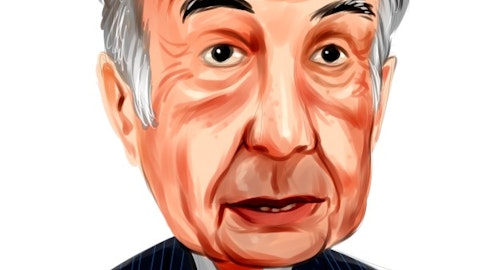There are always two sides to every coin, and although we’re long-term bullish on crude prices, we will analyze the bear case for oil in the near and medium-terms in this article.
While doing so, we’ll take a closer look at five energy-related companies, Exxon Mobil Corporation (NYSE:XOM), Petroleo Brasileiro SA Petrobras (ADR) (NYSE:PBR), Chesapeake Energy Corporation (NYSE:CHK), Transocean LTD (NYSE:RIG), and Seadrill Ltd (NYSE:SDRL) and see what the world’s most successful investors think of each stock.
We believe that imitating hedge funds and other large institutional investors can be helpful in identifying stocks capable of outperforming the broader market. Through extensive research that covered portfolios of several hundred large investors between 1999 and 2012, we determined that following the small-cap stocks that large money managers are collectively bullish on, can generate monthly returns nearly 1.0 percentage points above the market (see the details here).

curraheeshutter/Shutterstock.com
Exxon Mobil Corporation (NYSE:XOM), Petroleo Brasileiro SA Petrobras (ADR) (NYSE:PBR), and Chesapeake Energy Corporation (NYSE:CHK) were each in the spotlight this week due to OPEC’s agreement to limit crude production on Wednesday. Due to the tentative agreement by the group to cut production to 32.5 million-to-33 million barrels per day, down from the 33.2 million-to-33.4 million barrels per day currently being produced, crude futures rallied by around 7% on the week.
Follow Exxon Mobil Corp (NYSE:XOM)
Follow Exxon Mobil Corp (NYSE:XOM)
Receive real-time insider trading and news alerts
Although OPEC, which is regarded as basically the equivalent of a central bank for oil, has said that it will cut oil production, there is some room for doubt. First, although the group has generally agreed on the deal, OPEC won’t work out the specifics until November. Given that hammering out specifics is much harder than putting out generalized words, there is the possibility that the November OPEC meeting could unravel. For Iran, Libya, and Nigeria to continue to increase oil production back to their somewhat-historical norms, some estimate that Saudi Arabia would have to cut its production all the way down to 9 million barrels per day. If crude prices don’t rise sufficiently, Saudi Arabia would make less revenue and its market share would be taken by its arch enemy, plus some enterprising Texas shale drillers. Saudi Arabia would surely only tolerate this to ensure a successful Saudi Aramco IPO next year.
Follow Expand Energy Corp (NASDAQ:EXE)
Follow Expand Energy Corp (NASDAQ:EXE)
Receive real-time insider trading and news alerts
Second, even if they come to agreement, various OPEC nations could cheat their quotas and continue to produce as much as possible. If that occurs, the freeze/cut would be self-defeating and would only amount to a temporary boost. Most importantly, the only real sure-fire solution for higher oil prices is a broad-based increase in demand for the commodity, which can only happen if emerging markets and China recover. Given the impending increases in interest rates after election season, it is unclear if that scenario is guaranteed to happen in the near-term.
Perhaps because of those reasons, Exxon rallied by only 4.5% on the week, while Petrobras inched up by just 1.6%. Due to a convertible debt offering, Chesapeake shares fell by 5.4% on the week. Of the 749 funds that we track which filed 13Fs for the June quarter, 23 were long Petroleo Brasileiro SA Petrobras (ADR) (NYSE:PBR) on June 30, while 31 were shareholders of Chesapeake Energy Corporation (NYSE:CHK).
Follow Petroleo Brasileiro Sa Petrobras (NYSE:PBR)
Follow Petroleo Brasileiro Sa Petrobras (NYSE:PBR)
Receive real-time insider trading and news alerts
Meanwhile, smart money sentiment in the largest energy company of all (at least until Saudi Aramco IPOs) was relatively stable in the second quarter, as 60 funds remained long Exxon Mobil Corporation (NYSE:XOM) at the end of June, unchanged from the end of March.
On the next page, we’ll continue the bear argument while also looking at the state of Transocean and Seadrill.





